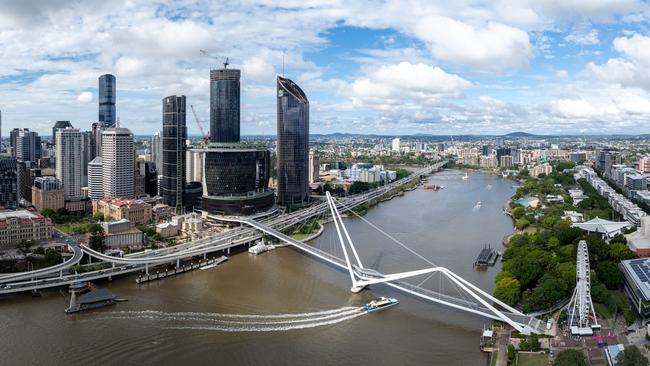Editorial: Bed tax could secure our tourism future
A bed tax is a small impost that would secure benefits everyone in the state could enjoy, writes the editor.

Opinion
Don't miss out on the headlines from Opinion. Followed categories will be added to My News.
Premier David Crisafulli should listen to the four Queensland mayors who wrote to him calling for a tourism bed tax to help fund infrastructure.
In the letter, Brisbane’s Adrian Schrinner, Gold Coast’s Tom Tate, Amy Eden from Cairns and Whitsundays Mayor Ry Collins called for a “opt-in” tax so they could keep up with surging infrastructure costs, which are exacerbated by booming tourism.
Their idea is a simple one, and is used by many jurisdictions across the world. Simply, tourists pay a levy (say 5 per cent) on top of their room rates at hotels, motels or Airbnbs. A $200 a night room would cost $210.
Local councils would choose whether to impose the levy.
They are just after the state government’s go-ahead. Mr Tate is a vocal supporter of the tax.
“You go to Vegas, Singapore, Dubai and you get additional room tax,” he said.
“It would raise funds to build tourism infrastructure for the city.”
We concur. It is a small impost on people who can afford it. And it would secure benefits everyone in the state could enjoy – as long as it is linked clearly and openly to tourism initiatives, not general council revenue.
Tourism Minister Andrew Powell has ruled out a statewide bed tax, but said he would listen to submissions from councils for local tourism levies.
With the 2032 Olympic and Paralympic Games rapidly approaching, there is no time to waste.
It’s time Queensland secured a new revenue stream to ensure tourists in 2032 are not disappointed.
HOW WE WEATHER TRADE WAR
It’s cold comfort for any Queensland exporters about to lose sales because of US President Donald Trump’s bizarre new tariff regime, but it could have been a lot worse.
For starters, Australia got off lightly – receiving the minimum 10 per cent increase of the tariff hikes handed out to the more than 60 countries judged by the Trump administration to have unfair trade barriers to US exports.
At least we’re not Vietnam, which copped a 46 per cent penalty, or Cambodia (49 per cent).
Australia’s – and Queensland’s – histories and economies are built on our success as exporters.
When the United Kingdom turned its back on its former colony by joining what would become the European Union in the early 1970s, Australia was forced to find new markets and relationships.
It was remarkably successful. Within a decade, our biggest trading partners were in Asia.
And when our now-most important export market, China, recently decided to punish Australia for various alleged sins – among them, calling for investigations into the source of Covid-19 – by imposing exorbitant tariffs and trade bans, we needed just a few years to replace much of the lost Chinese market with new customers, in India and beyond.
For the short term at least, these new tariffs probably won’t have a huge impact on Queensland’s exports to the US, which are currently running at about $3.5bn a year – two thirds of it beef.
Our competitors in the US market – Canada, Brazil and Uruguay among them – have all been hit with tariffs of 10 per cent or more, which means, relatively speaking, we’re still playing on a level field.
With that said, the new Trump tariff regime does pose big risks for Queensland and Australia. It will, inevitably, lead to all sorts of disruptions in global markets and a predicted slowdown in the US and world economies.
The biggest risk for Queensland will be the knock-on effect. Our largest trading partners have copped some of Mr Trump’s biggest tariff hikes – 34 per cent for China, 24 per cent for Japan and 25 per cent for South Korea.
Any resulting slowdown in their economies will inevitably mean less demand for our coal and LNG and minerals exports.
There’s little we can do at the state level to avoid whatever comes next and not much whoever wins the next federal election can do either.
The challenge Queensland and Australia, and indeed the rest of the world, face, is that Mr Trump’s new tariff strategy is unprecedented – you won’t find the theory being the new game plan in any economics textbook. Prime Minister Anthony Albanese summed it up well, saying the new tariffs “have no basis in logic”.
But they are now a fact of life. Mr Albanese correctly noted that “we can’t control what the administration determines,” but “we can engage with them”.
And while our political leaders and diplomats get on with pushing our case, our exporters will need to get on with the job of doing what they’ve done so successfully in the past – finding new markets.
Our future economic wellbeing depends upon it.
Responsibility for election comment is taken by Chris Jones, corner of Mayne Rd & Campbell St, Bowen Hills, Qld 4006. Printed and published by NEWSQUEENSLAND (ACN 009 661 778). Contact details here




